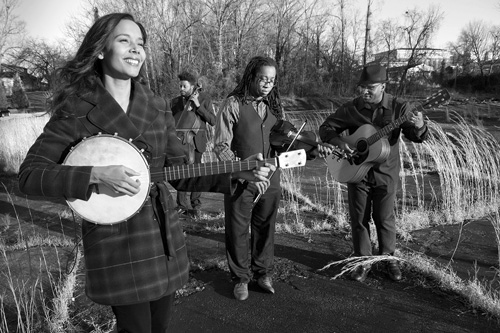Arts & Culture Sept. 2014
Music from the past, into the future
Carolina Chocolate Drops to perform at Fresh Grass Festival
By JOHN SEVEN
Contributing writer
NORTH ADAMS, Mass.
 When the Carolina Chocolate Drops perform at the opening night of this year’s FreshGrass festival in North Adams, Rhiannon Giddens, left, will be the only one of the founding members still in the band. The group will perform Friday, Sept. 19; the festival continues throughout the weekend.
When the Carolina Chocolate Drops perform at the opening night of this year’s FreshGrass festival in North Adams, Rhiannon Giddens, left, will be the only one of the founding members still in the band. The group will perform Friday, Sept. 19; the festival continues throughout the weekend.
When the Carolina Chocolate Drops take the stage on the opening night of this year’s FreshGrass Bluegrass Festival, they’ll be a different band than the one that performed here in 2012.
But Rhiannon Giddens, the banjo and fiddle player who now is the only founding member still in the group, says the Chocolate Drops are staying true to their roots-music mission – and their broad sense of African-American musical styles and history.
The Carolina Chocolate Drops will perform Friday, Sept. 19, at the start of the three-day FreshGrass festival, held on the grounds of the Massachusetts Museum of Contemporary Art. This year’s festival features 24 acts that run the gamut from The Gibson Brothers and Emmylou Harris to bands with local ties like The Novel Ideas and the Ramblin Jug Stompers. (A full schedule and ticket options can be found at freshgrass.com.)
The Carolina Chocolate Drops were born in 2005 when the three original members — Giddens, Dom Flemons and Justin Robinson — met at the Black Banjo Gathering in North Carolina. They found a mentor in fiddler Joe Thompson and learned his styles together.
The band’s 2010 album “Genuine Negro Jig” earned a Grammy Award for best traditional folk album of the year.
Robinson left the band in 2011, and Flemons left earlier this year, but Giddens decided to continue on alongside multi-instrumentalist Hubby Jenkins.
“Dom departing, it gave me the opportunity to really think about if I was going to continue the band,” Giddens said. “And if I was going to continue the band, I had to have a really strong idea of the band. I thought really hard about what the things are that make us unique. What are the things that even through the changes and the years and the personnel we have kept going? What is honest about what we do? And what do we do that serves the music so well? I really took the time to sit down and think of all that stuff.”
Giddens had a very clear idea of who needed to be in the Carolina Chocolate Drops -- musicians who shared the band’s ideals, who were interested in history just as much as music, and who would bring something of their own to the project.
So cellist Malcolm Parson and multi-instrumentalist Rowan Corbett joined around the beginning of the year, and Giddens says they clicked immediately.
“What I really tried to do was to keep a good amount of things that had become Chocolate Drops staples,” she said. “As the ensemble was playing together, … we started working up new material in the same similar vein, not pushing it, just letting it be what it’s going to be, and let the four of us feel the energy. That’s what we’ve always done: keep that through line going, and then let the new ensemble be what it’s going to be and not try to force it into an old mold.”
Reconnecting with early influences
Giddens says that in going over what material they wanted to keep and what material seemed more appropriate to Flemons’ delivery, the band has been going over earlier material that the previous line-up had left behind as well as building connections between the new members and the band’s mentor, Joe Thompson, who died in 2012.
“I’m the only one left who played with Joe, but that is what it is,” Giddens said. “I play the fiddle the way I play it and the banjo the way I play it because I played so much with Joe and with Dom and Justin, and so when we play these things, that influences how we play it. And it is a link. It’s not the same, but it’s still a link. I really believe in letting these things be organic and letting the music find its way.”
The challenge for Giddens has been to make sure the Carolina Chocolate Drops didn’t become the Rhiannon Giddens Band, something she has always worked to keep at bay.
“I knew when we first started out, I was the girl, so that might be a push, to put me out front, but I fought that,” Giddens said. “I thought we were about something very different, and I was not comfortable with any of that, so I’ve always been an advocate for ‘it’s a band,’ and I have no intention of becoming the lead singer.”
Even so, her position as the only founding member still in place has added to the impression that she’s the leader of the band.
“I’m the front woman at this point, because I’m the only original member left and I’m the only one with history from the beginning to now,” Giddens acknowledged. “But I knew that Hubby had tons to offer that he hadn’t really had the opportunity to do, and I knew that he would be a good partner. I never wanted it to be Rhiannon Giddens and the Chocolate Drops. That’s not what the band is about.”
Besides, Giddens has found an outlet for solo work. Over the past year, she has embarked on some projects without her fellow band members. It started last year with triumphant performances at the Another Day, Another Time concerts in New York and Los Angeles, spun off from the Coen Brothers’ film, “Inside Llewyn Davis.”
Solo projects
She’s also taking part in “Lost on the River: The New Basement Tapes,” a collection of unfinished Bob Dylan songs completed by the likes of Elvis Costello and Marcus Mumford.
“I felt like I could bring something non-reverential,” Giddens said of her involvement in the “Lost on the River” project. “I don’t really know much about Dylan; I didn’t know anything about the Basement Tapes. I felt like everybody else has probably got that set pretty well, so it was an opportunity to bring a blank slate to these sessions. It ended up turning out really well.”
During these outside-the-band projects, Giddens had a lot of interaction with musician and producer T-Bone Burnett, and he suggested they work together on a solo album, which seemed like an easy call for Giddens to make.
“I had plans on doing Chocolate Drops stuff, but T-Bone Burnett says he wants to do a solo record, and the record label says that’s a great idea,” she said. “I mean, you learn to take these opportunities as they come.”
Giddens’ solo album is devoted to the work of women in music that she loves, artists like Sister Rosetta Tharpe, Nina Simone, Jean Ritchie and Patsy Cline. She said she hopes people will not just enjoy her versions of these songs, but that the album will open musical doors for some people who might not be familiar with some of the artists. She sees the stories of many of these women performers as inspirational not just for herself but to anyone who loves music.
“I know how lucky I am as a woman musician, being able to tour on the road with my family, being able to make a living at what I’m doing, being able to run my business and not have people pushing back all the time,” Giddens said. “Reading biographies and autobiographies from women artists of previous generations, I understand how lucky I am. And I think it’s important to homage the women who came before who had to fight through a lot more stuff than I have had to fight through, to just remember that, to just go, ‘Remember this was kind of hard, and these women are pretty awesome for, despite that, making amazing music and having careers.’”
Giddens added that she doesn’t think some of the women, like Waters and Tharpe, have gotten their due in musical history, and she hopes to do her small part in correcting that. She hopes some of her versions will inspire people to look back to the originals.
Honoring history through music
History is important to Giddens, not only as an area of study but to provide context to the music she performs. Historical explanation is a regular part of Chocolate Drops performances, and it’s one that the band’s audience appreciates. The story behind a song, Giddens says, enhances one’s appreciation of it.
“The challenge is to keep it in a way that keeps the forward momentum of the show and doesn’t detract too much,” Giddens said. “And you want to figure out how to say things that people can take away the nugget and not miss the whole thing. So there’s a lot that goes into it, there’s a lot that I think about, and I’m always consciously honing that, because I don’t want to trespass too much on people’s patience. They’re there to see music.”
Focusing on history is also a way she can address important and sometimes heavy topics within context of the songs, connecting the dots but not forcing the seriousness to overtake the glory of the music.
“We’re singing songs about slavery, we’re singing songs coming out of minstrelsy, we’re singing songs coming out of incredible hardship,” Giddens said. “I really think that if you just ignore all that stuff, you’re not doing the music any favors and you’re also underestimating the audience. The audience can really get more than you think.”
Giddens also sees the songs the band performs as great equalizers, offering personal stories that bring the larger issues down to earth.
“Here’s the way that art can change the paradigm,” she said. “This is a song about a story that actually happened, and I remove myself from the equation, and I remove you from the equation, and you get what happened to this person. That is a way of experiencing it and going, ‘Oh, my gosh, this is something that we should uncover a little bit more.’
“That is the way I think is a good way forward, because it’s inviting rather than being combative. I believe that we need to address these things, but in a way that presents it in the sort of way that everybody can come to the table and have a piece of it.”

